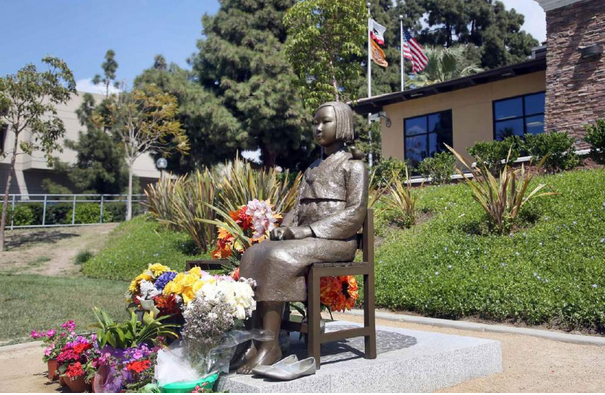![The bronze statue in Glendale’s Central Park commemorates the victims of sexual slavery during the Second World War. [Nick Ut/Associated Press]](http://www.jstudentboard.com/reporter/wp-content/uploads/2014/09/JSR_Sept6_ComfortWoman-300x195.jpg)
[Nick Ut/Associated Press]
The bronze statue of a young girl sitting next to an empty chair memorializes the 200,000 girls and women, the majority of whom were Korean or Chinese, coerced into sexual slavery by the Japanese Imperial army during the Second World War. It is the first memorial dedicated to comfort women on the West Coast.
The plaintiffs, a Japanese American resident of Glendale and a non-profit corporation known as the Global Alliance for Historical Truth, filed the lawsuit on the claim that the city’s erection of the statue infringed upon the federal government’s exclusive right to set foreign policy. The lawsuit stated that Glendale is “[taking] a position in the contentious and politically-sensitive international debate concerning the proper historical truth of the former comfort women.” However, Judge Anderson ruled that it neither brings about tangible harm nor contradicts the federal government’s policies.
Opponents of the statue also claimed that the monument encourages prejudice against Japanese people. Japanese citizens have also sent petitions to Glendale for the removal of the monument, and prime minister Shinzo Abe once issued a Cabinet statement asserting that the comfort women were voluntary prostitutes and refusing to issue an apology to survivors.
However, Abe’s declaration is countered by survivors’ accounts of the horrors and the abuse that occurred in the comfort stations, where the women were incarcerated until the end of the war.
“I could hear the pain in [the women’s] voices as they spoke of the atrocities that they endured as young girls at the hands of the militia,” said Glendale councilmember Paula Devine in an interview with JSR. “Even after all these years, they still have to live with that pain.”
“It is very important to recognize the plight of the comfort women, because awareness is essential to bring about justice and to make it clear that this type of violation against women is unacceptable, whether during war times or not,” Devine continued. “The dismissal of the lawsuit should give validation to the Korean American community.”
“Glendale has been one of the few cities to take the lead on the issue of comfort women,” said councilmember Ara Najarian to JSR. “When we were approached by the Korean American Federation about the placement of the statue…, we unanimously, as a city council, voted to approve that.”
Members of the city council plan to continue to honor the women and have taken other measures to increase awareness.
According to Najarian, the city council has also supported the issue by inviting surviving comfort women to speak at Glendale during a 2012 and installing an exhibition in the Glendale Central Library.
“[The women] know now that there is hope that this injustice will be recognized by the Japanese government and their suffering will not have been in vain,” said Devine to JSR. “I am proud to be a very small part of that accomplishment.”

